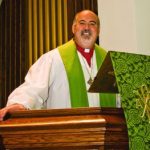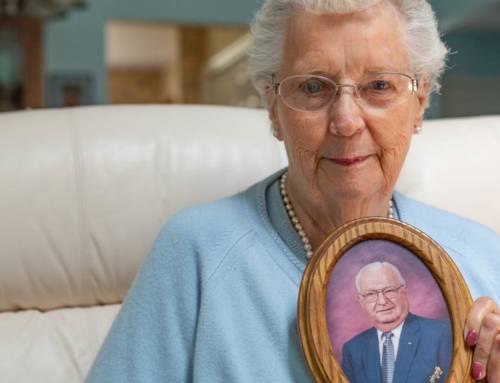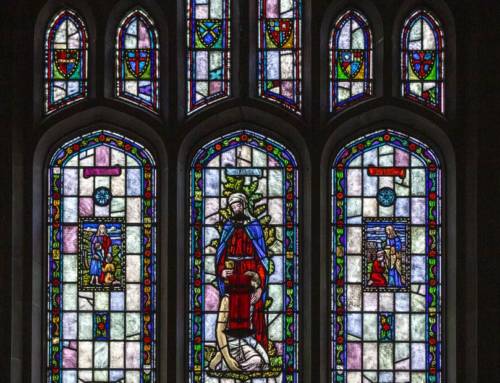
About the Author: Sunday Sermons from Sell Chapel are written by Rev. Preston Van Deursen, Director of Pastoral Care at the Masonic Village at Elizabethtown.
A friend of journalist David Halberstam was planning a visit to Japan. It would be his first visit, and he was a little anxious because he couldn’t speak Japanese. How would he communicate with the people he came in contact with?
Since most taxi drivers do not speak English, someone suggested that it might be a good idea to carry with him something bearing the name of the hotel at which he would be staying written in Japanese. That was exactly what he did. As soon as he arrived in Japan he picked up a box of matches bearing the name and address of his hotel. Then he went sight-seeing.
Afterwards he got into a taxi and did as the friend suggested, he took the box of matches out of his pocket to show the driver where he wanted to go. There were a few awkward moments before the driver understood. Finally his face lit up. Quickly they sped away. Half an hour later, the taxi came to a screeching halt. The driver turned and beamed at his passenger, pointing out the window. There was only one problem. They had stopped, not in front of a hotel, but a match factory!
Have you ever had an experience like that? Someone will say something and for whatever reason you do not understand. It’s as if they were speaking a foreign language. You want to go back to the hotel and instead find yourself in front of a match factory.
There is a wonderful story about two men from Mars who decide to do a little sightseeing on Earth. They realize that to avoid causing a panic they must appear as inconspicuous as possible. They obtain American clothing, learn the language, and in general make themselves as ordinary as possible.
During their first day on Earth nobody notices a thing unusual about them. At the end of the day they celebrate their successful foray at an exclusive restaurant. As they are paying their check, they are astonished to hear the waiter say, “You guys must be from Mars!”
“What?” asked the dumbfounded Martians. “How can you tell?”
“Well,” replied the waiter, “you’re the first customers to pay cash since I’ve been working here.”
There were times when Jesus tried to communicate profound truths to those around him and they acted as if he were from Mars. He would say something and he could watch their eyes glaze over. Particularly he had difficulty getting through to the religious officials of his day. They wanted nothing to do with him or his teachings. They condemned him without even listening to him. They were so sure of themselves and their standing in the community that they were impervious to everything he did or said. What would you do in that situation? You are trying to communicate something important, but they just don’t get it. You’re not getting through. That was the situation Jesus found himself in. So he did what he often did, he told a story. He told a story of rebellion that communicates some key information about our role in His kingdom. We are to remember that it is His kingdom, yet we have a responsibility to be good stewards.
There Is Rebellion in the Vineyard
A landowner planted a vineyard. It was huge and completely fenced in. It even had a watch tower to guard against outside attacks or wild animals. After a while the landowner could no longer maintain this vast estate so he leased it to the tenants and left it in their care. All he asked in return was a share of the produce at harvest time. The tenants gladly agreed.
When harvest time came the landowner sent some servants to the vineyard to collect his share of the produce. High in the watch tower the tenants saw the servants approaching. Instead of welcoming them, though, and handing over their rightful payment the tenants beat one of the servants, killed another and stoned yet another. Word reached the landowner. He was extremely displeased. He sent some more servants for his share and again the same thing happened.
Finally, the landowner decided to send his son. “They will respect my son,” he thought. When the tenants saw the son approaching, they said among themselves, “This is the heir; come, let us kill him and get his inheritance.” And that’s exactly what they did. The tenants killed the landowner’s son.
Rebellion is an ancient theme in the Bible. It is the story of Adam and Eve. It is the story of the tower of Babel. It is the story of the children of Israel during the Exodus. And the result is always the same alienation, heartbreak and tragedy.
We Are the Tenants.
A story was making the rounds during the last presidential campaign. An asteroid hits the speaker’s platform at a Seattle conference center, and Al Gore, George W. Bush and Bill Gates, founder of Microsoft and one of the richest men on earth, all arrive in heaven at the same time. They are greeted by the Almighty, who is sitting on His golden throne. First, the Lord speaks to Gore, asking what he believes in. “I believe in the Internet and a clean environment,” Gore replies. “Very good,” the Almighty says. “Come sit near me. “Then he asks George W. Bush the same question. “I believe in cutting taxes and taking good care of the military,” Bush replies. “Excellent,” says the Almighty. “Come sit near me. “ Then God asks Bill Gates what he believes. “I believe,” Gates replies, “you’re sitting in my chair.”
There are times when all of us try to put ourselves in God’s seat. There are times when all of us act as if the world is our fiefdom and we are supreme over all we survey. We forget that everything we have is on loan to us from God. We are temporary tenants. We don’t own anything, even though we sometimes act as if we own it all. Everything ultimately belongs to God.
There was a church located next door to a supermarket. Since the church was short on parking spaces and the supermarket was closed on Sundays, the church leaders asked the owner of the supermarket for permission to park in his lot. The owner’s response was “Fine. You are welcome to use it 51 weeks a year.” “What about the other week?” the church members asked. “That week,” said the owner of the market, “I’ll chain off the lot so you will always remember that the lot belongs to me, and not to the church.”
Good point. We act like owners when we are only tenants. This brings us to the second thing we need to say. Happiness comes to those who understand they own nothing. These tenants in our lesson were greedy. They wanted everything for themselves and were unwilling to give the landowner his fair share. The landowner, on the other hand, was generous. He had given them control of his vast estate. They could have all of its abundance. All he asked was a share of the produce. Sounds like you and me, doesn’t it? Sounds like every person who has ever walked this earth. God has provided for us so abundantly. All He asks is a small portion in return. But we are greedy. We want to withhold what is rightfully His. How sad. The happiest people who have ever lived are those who gratefully acknowledge the ownership of God.
William White once told of visiting his 98-year-old mother-in-law in a nursing home. He remembers her quietly saying, “Think of the lilies and how they grow.” Long ago this frail, blind woman made the discovery that all of life is a blessing from God. She spent much of her time repeating scripture verses that she learned throughout her life. The scriptures gave her both strength and comfort during many lonely hours. She was an active woman right up until she entered the nursing home, walking a mile a day, though her eyesight was gradually worsening. She loved people and was always helping them. Even in the nursing home she used a walker to spread her joyful faith.
“Facing each day is not easy for her,” White reflected, “but she keeps her spirits up.” How? She felt that even at ninety-eight she had a mission. There in the nursing home she was able to touch the lives of other residents as well as some employees. In fact some former employees who changed jobs still returned to the nursing home to spend time with this remarkable woman. William White was inspired when his mother-in-law told him how thankful she was to have memorized so many scriptures before she lost her eyesight. Those scriptures filled her heart with the Lord.
This dear 98-year-old lady did not have much left in this world but she had the only thing we ever really own her faith in God. Everything else that we have is on loan. Someday it will be passed on to someone else. Don’t you see? No matter how rich we are, if we are not rich toward God, we don’t have anything! The vineyard belongs to Him. Happiness is found in recognizing our place as His tenants His stewards. But there is one thing more to be said.
Jesus Calls Us to Good Stewardship.
We have another important responsibility. Jesus asked the religious officials what the owner of the vineyard would do to the rebellious tenants. They had no difficulty responding, “He will put those wretches to miserable death, and lease the vineyard to other tenants who will give him the produce at the harvest time.” Little did they know they were condemning themselves with their answer. You see, the parable was about them. They had been entrusted with the spiritual care of God’s people. Unfortunately, many of them looked upon it only as a job a way of earning a good living a source of prestige and power. They were so set in their ways that they stoned the prophets who threatened their comfortable life and eventually they crucified God’s own Son. That’s a warning to every one of us involved in religious work whether as clergy or as laity. We have a responsibility.
Tony Campolo tells the story of a great oil refinery. This refinery was huge. It employed all the modern techniques of chemical engineering. It was an impressive structure that was very well kept up. The interior was bright and shining. The workers were proud to be part of such a company. They made sure that the plant was clean and everything was in perfect working order. In fact the oil refinery soon gained a world-wide reputation. One day, some visitors asked to have a tour of the oil refinery. There was a reluctance at first to allow any guests. The visitors insisted. They had traveled a distance and wanted to tour the facility. The plant manager contacted his boss who reluctantly gave permission for the visitors to tour the plant.
The visitors walked through the vast chambers where they saw the processing petroleum, the gleaming pipes that carried the petroleum products from place to place, and the extensive organizational system that had been set in place to keep the refinery going. The visitors were impressed. Near the close one of them asked the guide if they might be permitted to see the shipping department. “What shipping department?” asked the guide clearly confused.
“Why, the shipping department from whence you ship out all the gasoline and oil you process here,” said the tourists. “We don’t have any shipping department,” answered the guide. “You see, all the energy products produced in this refinery are used up keeping the refinery going.” Could that be us? Is all our energy used up just keeping us afloat? Could it be that we are no better than Jesus’ enemies? Could it be that we, too, confuse our mission with comfort and ease? Would Christ receive the same reception here that he received there?
This is not our world, it’s God’s. This is not our church, it’s God’s. We are only tenants. Stewards. We have a responsibility to return to Him a portion of what is His already, and to use that which we have received to His glory.




